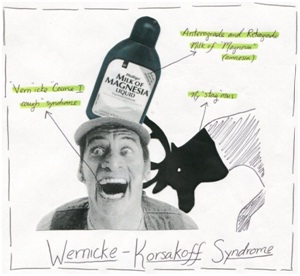Health A - ZW
Wernicke-Korsakof Syndrome Causes, Symptoms, Diagnosis and Treatment

What Is Wernicke-Korsakof Syndrome?
Wernicke-Korsakof syndrome is a brain disorder due to thiamine (vitamin B1) deficiency.
Also called wet brain, Korsakoff’s psychosis, and alcoholic encephalopathy, it is the combined presence of Wernicke’s encephalopathy (WE) and Korsakoff’s syndrome.
Causes Of Wernicke-Korsakof Syndrome:
Wernicke-Korsakof syndrome is caused by:
- Vitamin B1 deficiency
- High consumption of alcohol
- malabsorption (inability of the body to effectively absorb food)
Symptoms Of Wernicke-Korsakof Syndrome:
Some common symptoms may include:
- Confusion and loss of mental activity that can progress to coma and death
- Loss of muscle coordination (ataxia)
- Leg tremor
- Vision changes
- abnormal eye movements (nystagmus),
- double vision
- eyelid drooping
- Alcohol withdrawal
- Inability to form new memories
- Loss of memory
- Making up stories (confabulation)
- Seeing or hearing things that are not really there (hallucinations)
Diagnosis Of Wernicke-Korsakof Syndrome:
Wernicke-Korsakof syndrome can be diagnosed by:
- Clinical impression
- formal neuropsychological assessment
- Examination of the nervous/muscular system
- Tests to check nutrition level
- Serum albumin (relates to person’s general nutrition)
- Serum vitamin B1 levels
- Transketolase activity in red blood cells (reduced in people with thiamine deficiency)
Treatment Of Wernicke-Korsakof Syndrome:
The goals of treatment are to control symptoms and to prevent the disorder from getting worse.
Treatment includes:
- Vitamin B1 injections
- Monitoring and special care may be needed if the person is:
- Comatose
- Lethargic
- Unconscious
- Stopping alcohol use
- Eating a well-balanced, nourishing diet
By : Natural Health News




